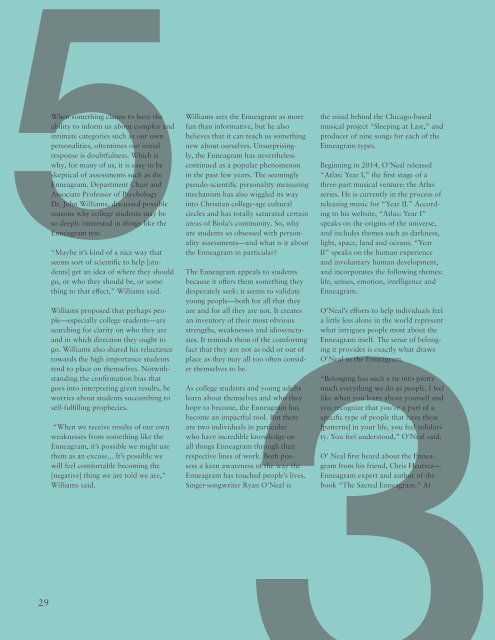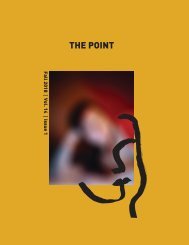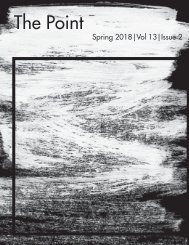The Point: Spring 2019
Spring 2019 | Volume 14 | Issue 2
Spring 2019 | Volume 14 | Issue 2
- No tags were found...
Create successful ePaper yourself
Turn your PDF publications into a flip-book with our unique Google optimized e-Paper software.
5When something claims to have the<br />
the<br />
ability to inform us about complex and<br />
intimate categories such as our own<br />
personalities, oftentimes our initial<br />
response is doubtfulness. Which is<br />
why, for many of us, it is easy to be<br />
skeptical of assessments such as the<br />
Enneagram. Department Chair and<br />
Associate Professor of Psychology<br />
Dr. John Williams, discussed possible<br />
reasons why college students may be<br />
so deeply interested in things like the<br />
Enneagram test.<br />
“Maybe it’s kind of a nice way that<br />
seems sort of scientific to help [students]<br />
get an idea of where they should<br />
go, or who they should be, or something<br />
to that effect,” Williams said.<br />
Williams proposed that perhaps people—especially<br />
college students—are<br />
searching for clarity on who they are<br />
and in which direction they ought to<br />
go. Williams also shared his reluctance<br />
towards the high importance students<br />
tend to place on themselves. Notwithstanding<br />
the confirmation bias that<br />
goes into interpreting given results, he<br />
worries about students succumbing to<br />
self-fulfilling prophecies.<br />
“When we receive results of our own<br />
weaknesses from something like the<br />
Enneagram, it’s possible we might use<br />
them as an excuse... It’s possible we<br />
will feel comfortable becoming the<br />
[negative] thing we are told we are,”<br />
Williams said.<br />
Williams sees the Enneagram as more<br />
fun than informative, but he also<br />
believes that it can teach us something<br />
new about ourselves. Unsurprisingly,<br />
the Enneagram has nevertheless<br />
continued as a popular phenomenon<br />
in the past few years. <strong>The</strong> seemingly<br />
pseudo-scientific personality measuring<br />
mechanism has also wiggled its way<br />
into Christian college-age cultural<br />
circles and has totally saturated certain<br />
areas of Biola’s community. So, why<br />
are students so obsessed with personality<br />
assessments—and what is it about<br />
the Enneagram in particular?<br />
<strong>The</strong> Enneagram appeals to students<br />
because it offers them something they<br />
desperately seek: it seems to validate<br />
young people—both for all that they<br />
are and for all they are not. It creates<br />
an inventory of their most obvious<br />
strengths, weaknesses and idiosyncrasies.<br />
It reminds them of the comforting<br />
fact that they are not as odd or out of<br />
place as they may all too often consider<br />
themselves to be.<br />
As college students and young adults<br />
learn about themselves and who they<br />
hope to become, the Enneagram has<br />
become an impactful tool. But there<br />
are two individuals in particular<br />
who have incredible knowledge on<br />
all things Enneagram through their<br />
respective lines of work. Both possess<br />
a keen awareness of the way the<br />
Enneagram has touched people’s lives.<br />
Singer-songwriter Ryan O’Neal is<br />
mind behind the Chicago-based<br />
musical project “Sleeping at Last,” and<br />
producer of nine songs for each of the<br />
Enneagram types.<br />
Beginning in 2014, O’Neal released<br />
“Atlas: Year I,” the first stage of a<br />
three-part musical venture: the Atlas<br />
series. He is currently in the process of<br />
releasing music for “Year II.” According<br />
to his website, “Atlas: Year I”<br />
speaks on the origins of the universe,<br />
and includes themes such as darkness,<br />
light, space, land and oceans. “Year<br />
II” speaks on the human experience<br />
and involuntary human development,<br />
and incorporates the following themes:<br />
life, senses, emotion, intelligence and<br />
Enneagram.<br />
O’Neal’s efforts to help individuals feel<br />
a little less alone in the world represent<br />
what intrigues people most about the<br />
Enneagram itself. <strong>The</strong> sense of belonging<br />
it provides is exactly what draws<br />
O’Neal to the Enneagram.<br />
“Belonging has such a tie into pretty<br />
much everything we do as people. I feel<br />
like when you learn about yourself and<br />
you recognize that you’re a part of a<br />
specific type of people that have these<br />
[patterns] in your life, you feel solidarity.<br />
You feel understood,” O’Neal said.<br />
O’ Neal first heard about the Enneagram<br />
from his friend, Chris Heutrez—<br />
Enneagram expert and author of the<br />
book “<strong>The</strong> Sacred Enneagram.” At<br />
29




